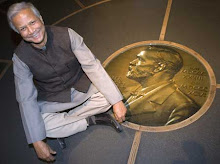Nobel winner: 'Social businesses are the future' Muhammad Yunus tells Stanford students to explore the untapped energy and talent of just plain people around the world
by Chris Kenrick Palo Alto Online Staff
Nobel Peace Prize winner Muhammad Yunus urged Stanford students to use their talents to develop "social businesses" to solve pressing problems such as global warming, unemployment and poverty.
Yunus is famous for thinking small, but in a big way. He is a pioneer "micro-credit entrepreneur" whose Grameen Bank has 7.5 million impoverished borrowers with loans averaging less than $200 and a payback rate of 98 percent. He also focuses on silver linings: The world's economic crisis offers "an enormous opportunity" to design a fairer financial system, he said in a talk Friday at Stanford.
"Now it's a question: who's more creditworthy, the rich or the poor?" Yunus said, drawing laughs from the standing-room-only audience. "So why don't we create a financial system that's an inclusive system?"
Technology offers a powerful weapon against poverty, Yunus said. He urged technology-minded students to live among the people they seek to help before designing their "high-impact social ventures."
"Sometimes we think we're doing good things but you find out it's absolutely the wrong thing," he said. "So be there with the people, know what the problems are, what real intervention is needed and what impact it makes."
Yunus was introduced by George Shultz, former U.S. Secretary of State and Hoover Institution fellow, who called the micro-lending pioneer "one of the world's great human beings."
Shultz said he asked Yunus if he'd donned a white tie and tails to receive the 2006 Nobel Prize. Schultz said he responded, "No, I just wore what I always wear."
"He's his own man," Shultz said of Yunus, a Bangladeshi economist who wore a tunic and vest over his trousers at Stanford Friday.
Yunus made his first loan in 1976: $27 from his own pocket to 42 Bangladeshi village women,who he thought were being cheated by moneylenders. They made profitable use of the money and repaid it.
Women now comprise 97 percent of the bank's borrowers, Yunus said, because the bank has found that "money going to a family through women had much more impact on the family than money going through men."
Loans are given to individuals for income-generating activities they are familiar to the recipients, such as raising chickens, cows or vegetables, and making baskets or sewing clothes.
The bank encourages borrowers to send their children to school and offers scholarships to those who perform well.
Attempting to break the cycle of poverty, it also makes loans in housing and education and now has 32,000 students in higher education and professional schools, Yunus said.
This year, Grameen Bank opened a branch in Queens, New York, where Yunus said there are now 380 borrowers, all women, with average loan amounts of $2,200 without collateral and a 99.5 percent repayment rate.
"We follow the same procedures as in Bangladesh and when other things are collapsing it's as strong as ever."
New York borrowers have created businesses in areas such as child care, elder care, housecleaning and flower arranging.
"Today we're small, but if we can enlarge it to, say, 10,000 borrowers costs will be covered with an interest rate of 15 percent," Yunus said.
Grameen also makes interest-free loans to beggars in poor countries, he said. With average loans of $15, the bank encourages the beggars going house to house to carry cookies, candies or toys to sell, giving people the option to give money or buy something.
"More than 7,000 have stopped begging completely and the remaining 90,000 or so are part-time beggars, mixing begging and selling at the same time.
"It's an amazing experience to be of some help to a beggar," he said. "They're very smart -- they know which houses are good for begging and which are good for selling. They don't have to go to business school; they already know about market segmentation."
Yunus outlined numerous other Grameen ventures, including a hospital and a partnership with the French company Groupe Danone to produce low-cost yogurt containing nutrients Bangladeshi children are missing in their diet. Grameen also has partnered with a French water company, Veolia, to offer clean water in Bangladeshi villages at a price of a penny for 10 liters.
"People can bring their own container, take 10 liters and that's it," Yunus said. "If it works and pays back, then we can repeat it.
"Once you develop a prototype you develop a seed. Now multiply the seed and it can be everywhere.
"That's the challenge to young people in a school like Stanford -- to develop a social business, because that's where the future lies," Yunus said.
"We see every day how human beings are packed with unlimited capacity, unlimited potential. They're not helpless people; they're as capable as anyone else. It's that society never gave them an opportunity to unwrap that gift. It's a matter of removing the barrier.
"We have not allowed the bulk of the population on this planet to unleash their creativity and talents, and that is our loss," he said.
Wednesday, February 18, 2009
Subscribe to:
Post Comments (Atom)



No comments:
Post a Comment